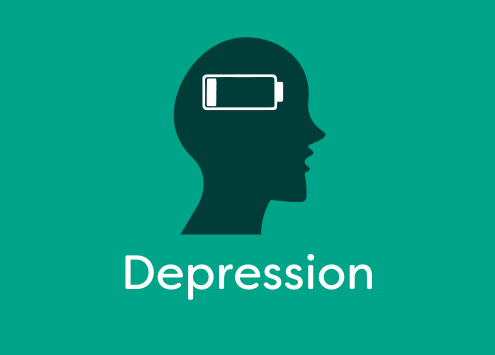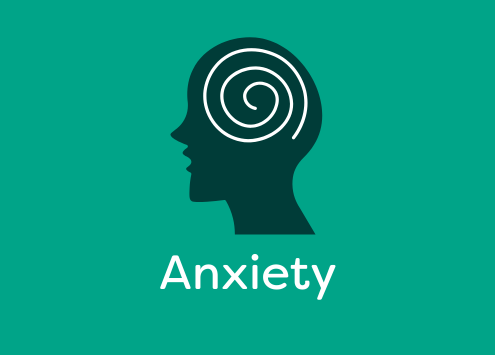 https://steponecharity.co.uk/wp-content/uploads/2024/01/237.png
355
700
Lauren
https://steponecharity.co.uk/wp-content/uploads/2024/02/step-one-wellbeing.svg
Lauren2024-01-24 12:46:092024-11-13 15:24:32Depression
https://steponecharity.co.uk/wp-content/uploads/2024/01/237.png
355
700
Lauren
https://steponecharity.co.uk/wp-content/uploads/2024/02/step-one-wellbeing.svg
Lauren2024-01-24 12:46:092024-11-13 15:24:32DepressionWhat is anxiety?
Anxiety is a normal body response and we all experience feelings of anxiety whether we recognise it or not. However, some people find it hard to control their worries. Their feelings of anxiety are more constant and can often affect their daily lives.
In cases such as this, the condition is commonly diagnosed as ‘Generalised Anxiety Disorder (GAD)’.
Anxiety is the main symptom of several conditions, including:
- Generalised Anxiety Disorder (GAD) – When a person struggles with raised anxiety and worry on a daily basis, which can be mild or severe.
- Panic disorder – An anxiety disorder where you regularly have sudden attacks of panic or fear. For someone with a panic disorder, feelings of anxiety, stress and panic occur regularly and at any time, for no apparent reason.
- Acute stress disorder – This can develop shorty after a traumatic event causing significant anxiety and flashbacks. Symptoms usually subside within 3-4 weeks.
- Post-traumatic stress disorder – Similar to an acute stress disorder but the symptoms persist for much longer, significantly affecting a person’s day-to-day life.
- Phobias – An overwhelming and debilitating fear of an object, place, situation, feeling or animal. They develop when a person has an exaggerated or unrealistic sense of danger about a situation or object.
Signs and symptoms of anxiety
- Feeling tense and unable to relax
- A sense of dread and feeling constantly on ‘edge’
- Irritability and difficulties concentrating
- Social withdrawal
- Seeking lots of reassurance from others
- Dizziness and tiredness
- Strong, fast or irregular heartbeat
- Trembling or shaking
- Excessive sweating and shortness of breath
- Lack of energy, muscle aches and pains
- Dry mouth, feeling sick and headaches
- Panic attacks
Helping someone with anxiety
- Provide opportunity for the person to talk. If the person does not initiate a conversation with you, you should say something to them
- Choose an appropriate time where you will both feel comfortable, without distractions
- If the person is experiencing symptoms of a panic attack, suggest a change in location where they will feel more comfortable
- Encourage them to breathe slowly, in through their nose and out through their mouth
- Provide reassurance and be caring in your approach. Try to focus on positive points
- Listen to them carefully, remain calm and provide reassurance that they will feel better soon
- Accept what they say without judging them and show your understanding in the situation
- If they feel uncomfortable, you can help them access information and resources
- Assist in signpost to professional support such as their GP, if this is appropriate
Useful contacts
Anxiety UK
Charity providing support if you’ve been diagnosed with an anxiety condition
Phone: 03444 775 774 (Mon to Fri, 9:30am to 5:30pm)
Website: www.anxietyuk.org.uk
Samaritans
Confidential support for people experiencing feelings of distress or despair
Phone – 116 123 (24-hour helpline)
Website – www.samaritans.org.uk
Men’s Health Forum
24/7 stress support for men by text, chat and email
Website: www.menshealthforum.org.uk
Mental Health Foundation
Provides information and support for anyone with mental health problems or learning disabilities
Website: www.mentalhealthfoundation.org.uk
Mind
Promotes the views and needs of people with mental health problems
Phone – 0300 123 3393 (Mon to Fri, 9am to 6pm)
Website – www.mind.org.uk
No Panic
Voluntary charity offering support for sufferers of panic attacks and OCD
Phone – 0844 967 4848 (Daily, 10am to 10pm)
Website – www.nopanic.org.uk
Rethink Mental Illness
Support for people living with mental illness
Phone – 0300 5000 927 (Mon to Fri, 9:30am to 4pm)
Website – www.rethink.org



